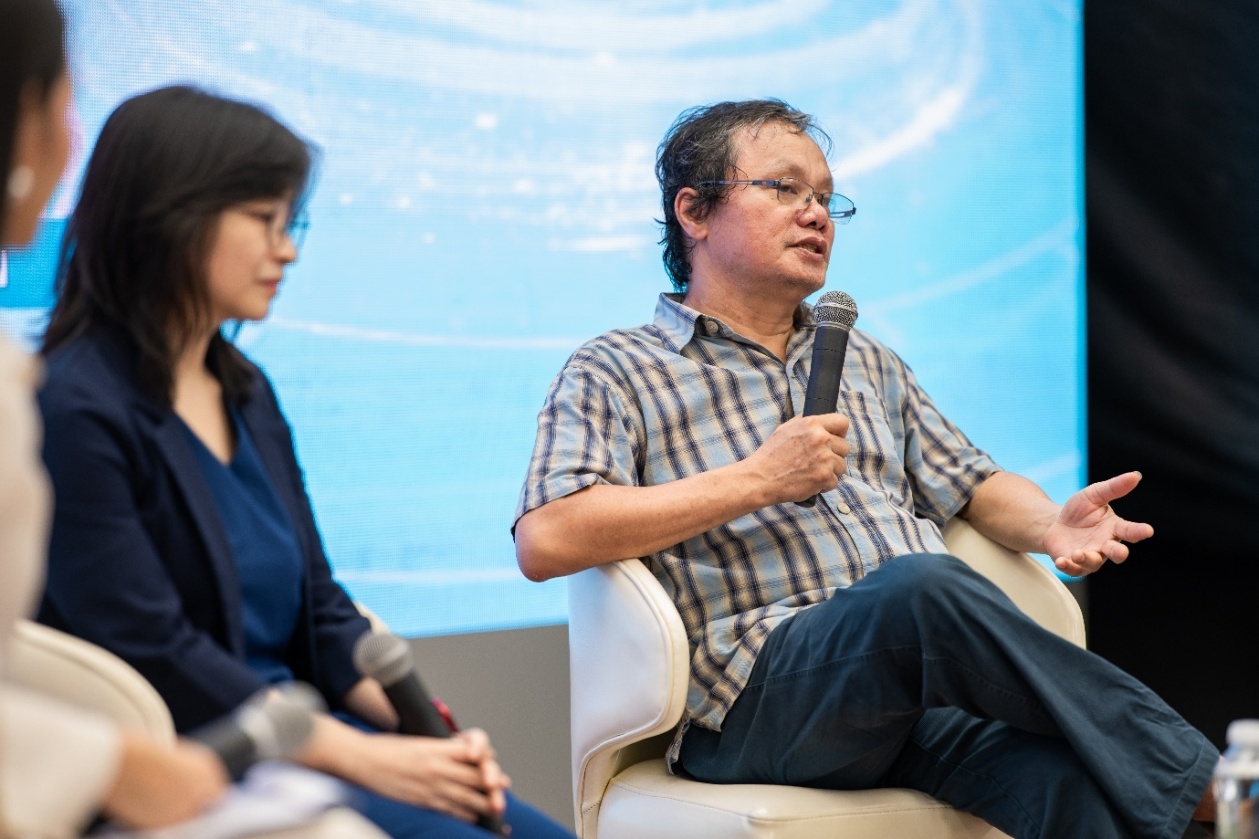Dr. Huynh Trung Trieu, deputy head of the pediatric intensive care unit at the Ho Chi Minh City Hospital for Tropical Diseases, revealed this information at a seminar held at the Ho Chi Minh City Book Street at the end of July. He emphasized that the costs sometimes exceed 150-200 million VND.
"In reality, there are many cases with severe complications, such as multiple organ damage and prolonged infections, requiring ventilators and organ support treatment. The treatment period can last for more than a month, further increasing the financial burden," he explained. Dr. Trieu has treated hundreds of dengue fever cases, involving both the elderly and young children.
 |
Dr. Huynh Trung Trieu addressed numerous questions about dengue fever at the seminar at the end of July. Photo: Takeda |
Dr. Huynh Trung Trieu addressed numerous questions about dengue fever at the seminar at the end of July. Photo: Takeda
Several hospitals in Ho Chi Minh City have reported an increase in severe cases admitted in a state of profound shock, primarily due to delayed detection and treatment in the initial stages. Many people mistake dengue fever for the flu or a viral fever, and only seek medical attention when a rash appears.
Dr. Truong Huu Khanh, standing vice president of the Ho Chi Minh City Infectious Diseases Association, emphasized the danger of this misconception. If the body develops a hemorrhagic rash, cold extremities, or bruising, the disease has already progressed to a severe and unpredictable stage. "I have witnessed cases where a child was conscious and talking one minute and deceased the next, without even entering a coma," he said.
 |
Dr. Truong Huu Khanh. Photo: Takeda |
Dr. Truong Huu Khanh. Photo: Takeda
Experts point out that many people believe the illness is over once the fever subsides. However, the critical period for dengue fever typically falls between the 3rd and 7th day, which is when the fever begins to break. At this time, the risk of shock, multiple organ failure, and bleeding is highest.
Many individuals self-administer intravenous fluids at home or use inappropriate fever reducers, such as aspirin and ibuprofen. According to the Ministry of Health, these practices can cause edema, organ damage, or worsen bleeding.
Even after surviving the critical phase, the burden on patients does not end. Many individuals, especially young children, continue to experience physical exhaustion, digestive disorders, insomnia, weight loss, hair loss, and psychological instability after being discharged from the hospital.
Experts cite a severe case where a child, after 7 days of dengue fever, was thought to be stable and discharged. However, the child later experienced seizures due to encephalitis, requiring readmission to the intensive care unit. The child needed a ventilator, anticonvulsant medication, and other supportive treatments.
Dr. Le Thi My Duyen, from the Vaccination Unit of Ho Chi Minh City University of Medicine and Pharmacy Hospital, explained, "For individuals in good health, recovery typically takes 7-10 days. However, for those with underlying heart, liver, kidney, diabetes, or obesity conditions, treatment is often more complex, and the risk of serious complications (such as heart failure, liver and kidney failure, and blood clotting disorders) is higher."
 |
According to Dr. Duyen, some children have developed chronic kidney disease after dengue fever treatment and require regular check-ups for many years. Photo: Takeda |
According to Dr. Duyen, some children have developed chronic kidney disease after dengue fever treatment and require regular check-ups for many years. Photo: Takeda
The financial impact of dengue fever extends beyond hospital fees. Many patients and their families have to take extended time off work for treatment or care, resulting in lost income while expenses continue to accrue. For self-employed individuals or those without health insurance, hospitalization often leads to income loss, placing a heavy burden on their families.
Dengue fever is no longer seasonal and can occur at any time of the year, increasing the risk of unexpected disruptions to work, school, and daily life.
Vietnam has extensive clinical experience in treating dengue fever. Dr. Huynh Trung Trieu highlighted that much of the global research data and dengue treatment practices are compiled from leading Vietnamese hospitals.
"The dengue fever mortality rate in Vietnam is among the lowest globally, thanks to effective clinical management and experienced medical personnel," Dr. Trieu stated.
However, reducing the burden of this disease cannot solely rely on medical capabilities. Proactive prevention, early detection, and timely intervention from the public are crucial. Dr. Truong Huu Khanh noted that during each outbreak, the healthcare system faces immense pressure. Seeking early medical attention can prevent severe cases, reduce costs, and alleviate hospital overcrowding.
Furthermore, consistent and regular preventive measures are necessary, not just during peak seasons. Dr. My Duyen advises the public to maintain mosquito prevention measures, such as: wearing long-sleeved clothing, sleeping under mosquito nets day and night, eliminating stagnant water around the house, applying mosquito repellent correctly, and actively getting vaccinated against dengue fever, especially those living in endemic areas.
Dong Ve
| Content provided by Takeda Pharmaceuticals Vietnam Co., Ltd., and professionally approved by the Vietnam Preventive Medicine Association to raise public awareness. |












